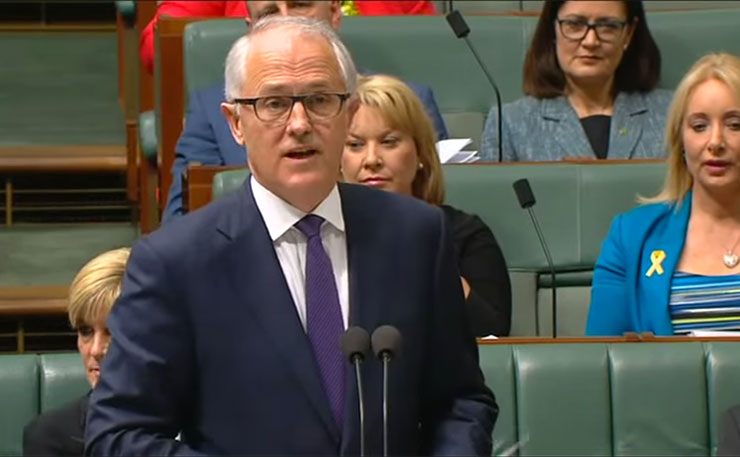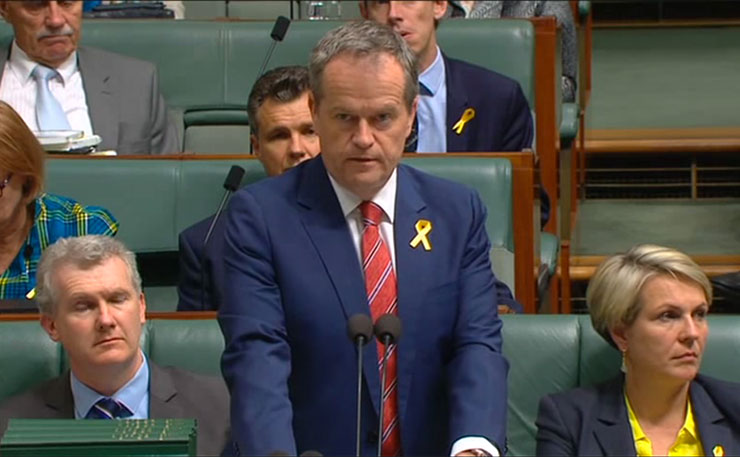The speech set out Labor’s plans for the future. As the world gathers in Paris to work towards a consensus on how to deal with a truly existential threat, Australia looks to be turning a corner on climate action, writes Max Chalmers.
Opposition Leader Bill Shorten has had a big week of policy announcements. But undoubtedly the most important is Labor’s new position on climate change and emissions reductions. With Tony Abbott out of the lodge could we be about to see a major shift in an area the party has been bullied out of? Here are the quick, initial takeaways from Shorten’s big address.
The Policy
Shorten’s announcement included two new commitments from Labor. If acted upon they would equate to a significant increase in the cuts to our emissions, as well as a major commitment to offset whatever pollution we will continue to produce.
The first pledge was that a Labor government would bring Australia to a position of net pollution zero by 2050. This doesn’t mean the country will stop producing emissions, burning coal, or polluting in general. But Labor has committed to offsetting whatever pollution we are creating by 2050. You burn some carbon here, you need to cancel it out somewhere else.
“This means by 2050, every tonne of pollution we produce will need to be balanced by sequestering, off-setting or purchasing,” Shorten said. That was about as much detail as we got for announcement one.
Shorten then announced a second plank to the policy: a 45 per cent cut to Australia’s emissions by 2030, based on 2005 levels.
That’s a significant increase on what has been proposed by the Coalition.
In August the government committed Australia to a 26-28 per cent reduction on 2005 levels by 2050. That was slammed as woefully inadequate, ‘defeatist’, and ‘a joke’. As my colleague Thom Mitchell demonstrated at the time, the feeble defences but forward by Greg Hunt and Tony Abbott failed to distract from the fact those accusations were fair.
According to data compiled by the Climate Institute, Labor’s new target will put Australia well above nations Like Canada, Japan and New Zealand in terms of its cuts on 2005 emissions, and just out of reach of more ambitious actors like Switzerland and the UK.
Unlike the Coalition’s target, Labor’s now falls around the midpoint of the cuts the Climate Change Authority says the country needs to commit to.
On top of these two key changes, Shorten also gently reminded us Labor remains committed to a goal of 50 per cent renewable energy by 2030, as well as an Emissions Trading Scheme.
The Pressure On Malcolm

The gauntlet has now been thrown down to Malcolm Turnbull: is he prepared to pull us in line with the rest of the world?
Earlier in the year we argued there was good reason to think that if Labor campaigned hard on renewable energy there could be an electoral reward in it for them. Shorten now appears to want to take the fight a step further, and he’s taking it right to Turnbull’s door.
“Malcolm Turnbull is flying to Paris carrying Tony Abbott’s climate-sceptic baggage,” Shorten said. “Malcolm Turnbull may have won the leadership vote in the party room, but Tony Abbott has won the climate policy debate in the Liberal party.”
It’s not particularly hard to see what’s happening here. Shorten is trying to wedge Turnbull against his own doubters in the Liberal/National party rooms. Given Turnbull’s long-held criticisms of his party’s current approach to climate action, it’s also a fair point for Shorten to make.
“I get that there are some people who just can’t work out the evidence,” Shorten said. “But what do we say about someone who has worked out the evidence and still refuses to act? This is selling out the future of the people of Australia, to placate the right wing of the Liberal party.”
You get the impression that on some level Malcolm Turnbull must know that’s true. Turnbull now has a decision to make: overcome the climate sceptics in his own party and then take the fight back to Shorten, or argue a case he surely does not believe – that it is morally acceptable for Australia to avoid its responsibly to help the world avoid catastrophic levels of warming.
The Inspiration
Inspiration. Not a word you would normally associate with Shorten. But in today’s address he did show some fight and, dare we say, vision.
For a start, he called for Australia to take moral responsibility.
“We cannot ignore our record, or escape the reality. We are the 13th largest polluter in the world, with the highest emissions per person in the OECD. And despite Liberal Government accounting chicanery, our domestic emissions are going up, not down.”
Shorten opened his remarks by referencing his recent tour of the Pacific, which took him to the coral atoll nations at the front line of the climate wars, already being nibbled away at by the warming planet and rising seas.
“For these island nations, climate change isn’t a ‘political’ argument or an ‘economic’ dilemma. It is an existential threat – a matter of survival. A violation of basic human safety and basic human rights,” he said.
Perhaps most impressively, he put the idea of scepticism on the table, having a big swing at those who would continue to deny human activity is responsible for that warming.
“…no area of scientific inquiry in the past 30 years has been more rigorously tested, scrutinised and peer-reviewed,” Shorten noted. “So let’s not pretend we have an obligation to give equal weight, coverage and credence to the babble of denialist militia. We don’t need to ‘believe’ in gravity, we know it exists.
“We don’t need to ‘believe’ smoking causes cancer and heart disease, we understand it is a medical fact. We don’t need to ‘believe’ asbestos kills, we see it does.”
Strong words. And important ones too, given the significant number of Australians who still don’t see the link between human action and climate change.
There’s a lot more to say about the ambition of Labor’s current policy settings, and here at New Matilda we’ll be analysing them further in the coming days.
But on the political level I’ll leave you with this.
It’s often said that Labor’s failure to pass an ETS under the first Rudd government was a turning point in the country’s approach to climate action, a missed opportunity that opened room for Tony Abbott to take the reins of opposition and completely wreck the joint. With Abbott finally cut down from the highest level of public life Labor is once more showing a willingness to project a little vision in the area.
Leaders from across the globe will be meeting in Paris in the coming days. Millions of people will march around the world, taking to the streets to demand climate justice, and to defy the vested interests that would see further delays in action. As this piece goes live, Melbourne’s march has already begun.
It may well be that at the very moment the world is nudged towards action – towards a consensus that could protect against a century of deepening poverty, health crises, and super-charged natural disasters – Australia is ready to go with it.
Find Your Local Climate March This Weekend:
MELBOURNE
Where: State Library, Friday 5.30PM
Who: Geoff Cousins, ACF President; Millie Telford, SEED indigenous youth climate network, Cardinal Rodriguez, a Honduran Cardinal of the Catholic Church and the Vatican spokesperson with the IMF and World Bank on the issue of Third World Debt, Luke Hilakari, Secretary of the Victorian Trades Hall Council, Jacinta Morahan, GP and community campaigner from Surf Coast Air Action in Anglesea.
SYDNEY
Where: The Domain. Sunday 1pm
1 hour pre-march event and entertainment from 1 – 2pm. The march will then start at 2pm and head out of Art Gallery Road, past the north end of Hyde Park and down Macquarie St. Finishing before the Opera House roundabout.
Speakers include Tim Flannery, Clover Moore and Aunty Jenny Monroe, musicians, video, crowd participation.
BRISBANE
Where: Queen’s Park Brisbane. Saturday 9:30am
Who: 1 hour pre-march event from 9:45am. Event finishes at12:30pm. The march will start at 11am and head down George Street Brisbane, over the Kurilpa bridge down Gray street and heading over the Victoria street bridge ending back at Queen’s park for a musical guest.
Speakers include Adrian Burragubba, Dean McNulty, Rebecca Farley Tallara Gray and Stella Miria-Robinson.
PERTH
Where: Wellington Square. Sunday 1pm
Who: Performers including The Brow (Horn Orchestra), Mei Saraswati and the Working Voices Choir. 1 hour pre-march event and entertainment from 1 – 2pm mc’d by Jim Morrison and Thierra Clanton. The march will then start at approx 2pm heading out of Wellington Square along Hill Street, down Hay Street into Hay Street Mall finishing at William Street.
Other speakers include Dr Petra Tschakert (Centenary Prof in Rural Development UWA), Les McLaughan (Electrical Trades Union), Dr Noel Nannup (Nyoongar Elder), a Member of the Fire Brigade, multi faith reflection and crowd participation.
HOBART
Where: Parliament Lawns, 1 – 2pm Sunday.
Who: Greg Irons (Finalist Young Australian of the Year 2012 and wildlife rescue campaigner), John McRae (Uniting Church), Tony Brennan (Catholic Earthcare), Greg Cooper (United Fire Fighters Union), Matthew Pitt (farmer and climate champion), Jack Redpath and Pano Russo (Fossil Free UTAS and AYCC), music (Zac Henderson).
Donate To New Matilda
New Matilda is a small, independent media outlet. We survive through reader contributions, and never losing a lawsuit. If you got something from this article, giving something back helps us to continue speaking truth to power. Every little bit counts.





